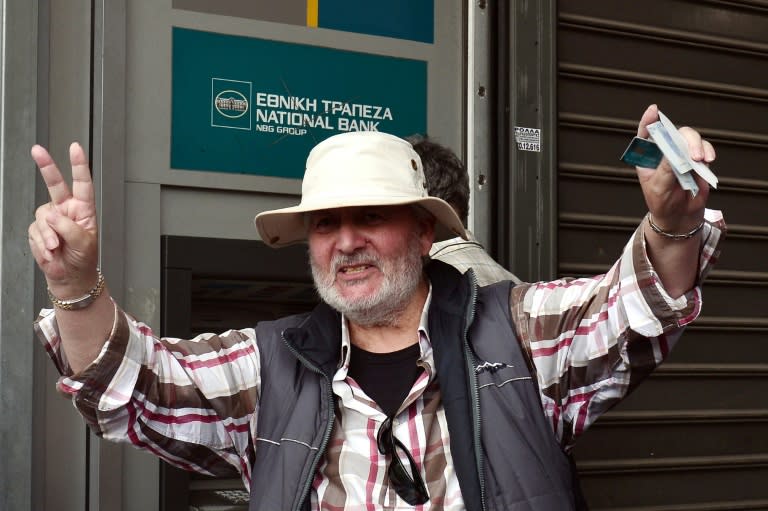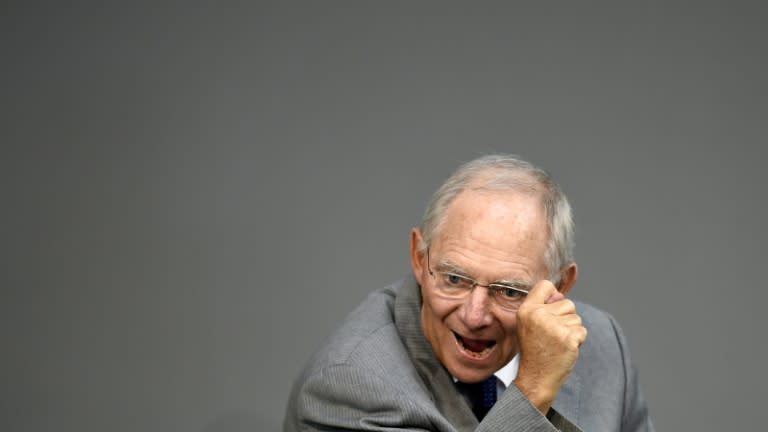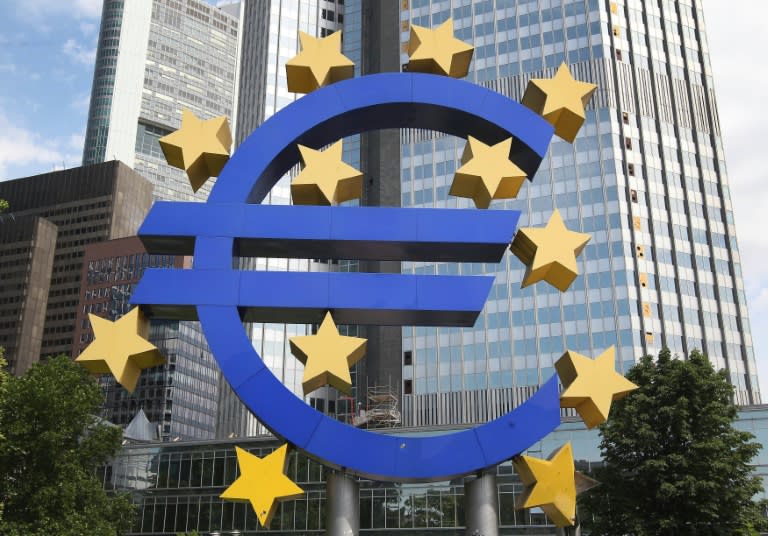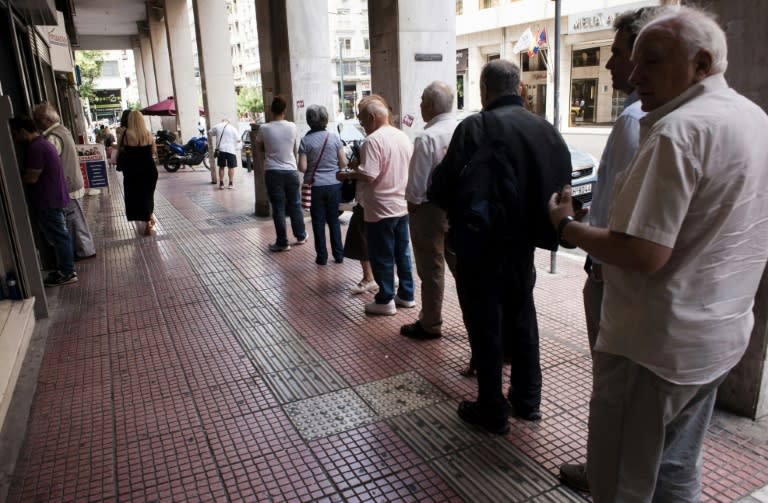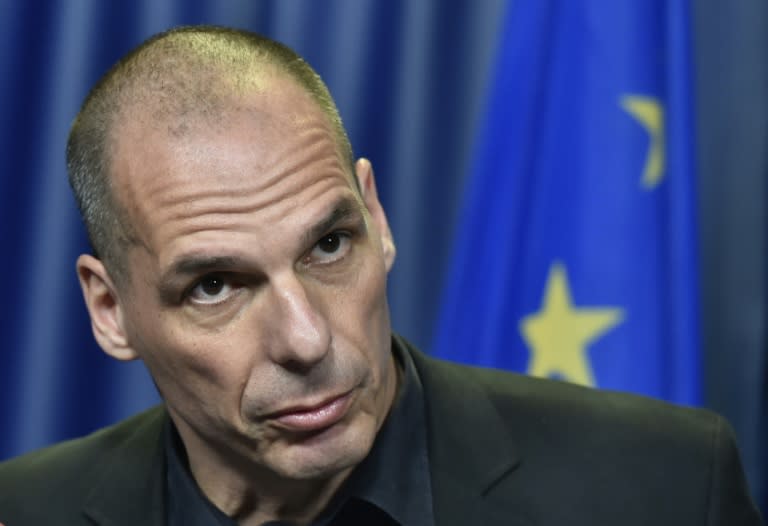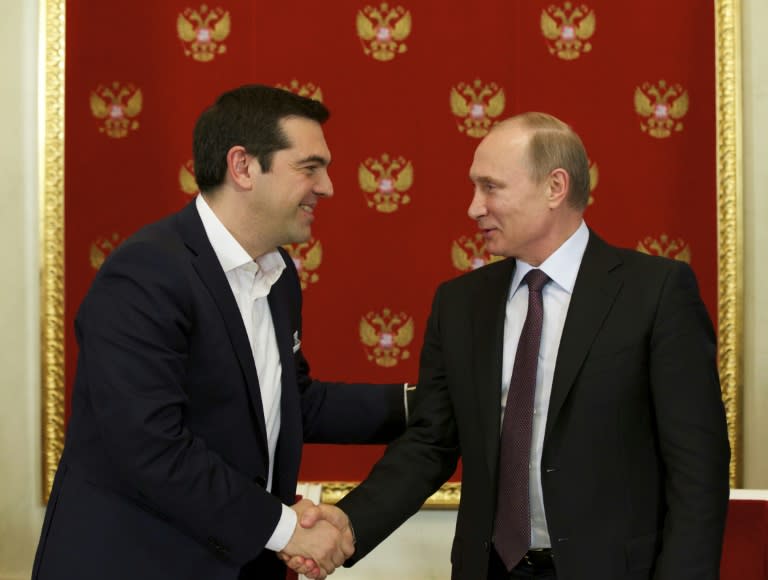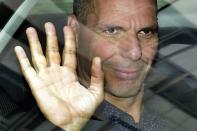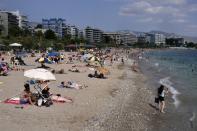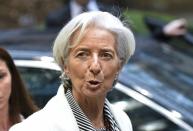Greeks vote 'No' - What now? LIVE REPORT
15:55 GMT - AFP IS NOW CLOSING THIS LIVE REPORT on the fallout after Greece said 'No' to more austerity in a historic referendum, dismaying its European creditors and making the country's exit from the euro more likely. Here are the main developments: * Greece's flamboyant finance minister Yanis Varoufakis resigned, in a move seen as a concession to creditors irked by his sometimes erratic approach to negotiations * He was replaced by Oxford-educated economist Euclid Tsakalotos, Greece's top negotiator in the stalled EU-IMF talks * Eurozone finance ministers are to meet at 1100 GMT on Tuesday, hours before leaders from eurozone nations meet in an extraordinary summit * Greek Prime Minister Alexis Tsipras and German Chancellor Angela Merkel have agreed that Greece will present fresh economic proposals on Tuesday 15:46 GMT - Silver linings - Even if Greece tumbles out of the euro, it's not all doom and gloom, economists say, and some even predict a relatively rapid bounce-back after an initial, painful period of uncertainty. With a cheaper currency Greek tourism and shipping, two major components of the economy, will become far more competitive, creating jobs and eventually domestic demand for goods and services, economists say. 15:42 GMT - New minister - Economist Euclid Tsakalotos, Greece's top negotiator in the stalled EU-IMF talks, has been named as the country's new finance minister, the president's office says. "Euclid Tsakalotos will take his oath of office at 1700 GMT today," it says. 15:41 GMT - Lifeline - The European Central Bank will hold a telephone conference call starting at 1600 GMT to discuss whether to keep an emergency liquidity lifeline open to Greek banks, several eurozone central bank sources say. According to three different sources, the ECB's decision-making governing council will discuss whether to continue to provide financing to Greek banks via the Emergency Liquidity Assistance facility. 15:40 GMT - GREECE'S BAILOUT NEGOTIATOR EUCLID TSAKALOTOS NAMED NEW FINANCE MINISTER - 14:44 GMT - 'Not people, positions' - Germany plays down the significance of Varoufakis's resignation. "It is not about people but rather positions," Chancellor Angela Merkel's spokesman Steffen Seibert says. 14:34 GMT - Varoufakis inspires - Greece's former finance minister Yanis Varoufakis, who rides a motorbike and sometimes attended high-level meetings wearing a casual shirt and no tie, appears to have inspired journalists and other pundits, who have ascribed to him a host of epithets. These include: iconoclastic, pugnacious, flamboyant, poker-faced, maverick, bold, brash, toxic, erratic Marxist, libertarian Marxist, unconventional, combative, corrosive, athletic, charismatic, mercurial, idiosyncratic, game theorist, earnest, energetic, handsome, chiselled ... 14:32 GMT - IMF ready to help - International Monetary Fund chief Christine Lagarde says the global crisis lender will assist Greece if asked. "The IMF has taken note of yesterday's referendum held in Greece. We are monitoring the situation closely and stand ready to assist Greece if requested to do so." 14:26 GMT - IMF 'READY TO ASSIST GREECE IF REQUESTED' - LAGARDE - 14:22 GMT - Greek parties unite - The leaders of most Greek parties will issue a joint statement calling for a debt deal, Defence Minister Panos Kammenos, whose party is in coalition with the ruling Syriza party, says. "There is no other option but a deal," Kammenos tells reporters after a seven-hour meeting, adding: "Soon you will have the joint statement signed by all leaders except the Communist party... giving strength to the prime minister to go to Brussels tomorrow and negotiate on behalf of the Greek people." 14:09 GMT - GREEK PARTY LEADERS TO ISSUE JOINT STATEMENT ON DEBT DEAL: DEFENCE MINISTER - 13:38 GMT - Piketty slams Germany - Top economist and influential author Thomas Piketty strongly criticises Germany in its attitude to Greece in an interview with German newspaper Die Zeit. "What struck me while I was writing is that Germany is really the single best example of a country that, throughout its history, has never repaid its external debt. Neither after the First nor the Second World War." "Germany is the country that has never repaid its debts. It has no standing to lecture other nations," Piketty said, in an article translated from German. 13:20 GMT - Story so far - Greece said "No" to more austerity in a historic referendum on Sunday, dismaying its European creditors and making the country's exit from the euro more likely. Here are the main developments since then: * Greece's flamboyant finance minister Yanis Varoufakis has resigned, in a move seen as a concession to creditors irked by his sometimes erratic approach to negotiations * Greece is fast running out of cash, with restrictions on bank withdrawals, the economy in deep freeze and its banking sector propped by a European Central Bank lifeline * The ECB has pledged to keep Greek banks solvent for now, but it is unclear how long that will last * Eurozone finance ministers are to meet at 1100 GMT on Tuesday, hours before leaders from eurozone nations meet in an extraordinary summit * Greek Prime Minister Alexis Tsipras and German Chancellor Angela Merkel have agreed that Greece will present fresh economic proposals on Tuesday 13:13 GMT - 'Greeks need help' - Eurozone leaders gathering for an emergency summit Tuesday should discuss humanitarian aid for the debt-mired country, German Economy Minister Sigmar Gabriel says. "We must now cover their needs very quickly. The people there need help and we should not refuse it just because we're unhappy with the result of the referendum (Sunday on creditors' bailout terms)," Gabriel, who is also Germany's vice chancellor, tells reporters Monday. 13:01 GMT - EU SUMMIT LIKELY TO DISCUSS HUMANITARIAN AID FOR GREECE: GERMANY - - Varoufakis - 12:51 GMT - Varoufakis's memorable moments (2) - July 3 -- "This is not the way to run a monetary union. This is a travesty. It's a comedy of errors for five years now, Europe has been extending and pretending." In a BBC interview. July 4 -- "What Brussels and the troika want today is for the 'Yes' (vote) to win so they could humiliate the Greeks. Why did they force us to close the banks? To instil fear in people. And spreading fear is called terrorism." July 6 -- "I shall wear the creditors' loathing with pride." 12:46 GMT - Varoufakis's memorable moments (1) - Greece's pugnacious finance minister Yanis resigned on Monday after five turbulent months in the job. Here are some of his more memorable quotes: February 5 -- "From my point of view we didn't even agree on the fact that we disagree." Speaking in Berlin after talks with German counterpart Wolfgang Schaeuble. March 15 -- "Little insignificant liquidity problems should not divide Europe." In a talk show to German channel ARD. April 25 -- "'They are unanimous in their hate for me; and I welcome their hatred.' A quotation close to my heart (& reality) these days," he said on Twitter, borrowing a quote from US president Franklin D. Roosevelt in a 1936 speech. 12:41 GMT - Proposals on Tuesday - Greek Prime Minister Alexis Tsipras and German Chancellor Angela Merkel spoke by telephone and agreed that Athens will present proposals to a eurozone summit on Tuesday, a Greek government source says. "They agreed that the prime minister will present the proposals of the Greek government at the summit". 12:36 GMT - Italian PM - Italian Prime Minister Matteo Renzi has called for talks on resolving Greece's debt crisis not to focus only on austerity but also on strategies to boost growth. "We have been urging for months to talk not only about austerity and balance sheets but about growth, infrastructure, common policies on migration, innovation, the environment," he writes on his Facebook page. "Tomorrow's meetings should point to a definitive way to resolve this emergency," Renzi says, referring to a meeting Tuesday of EU finance ministers and a summit of Eurogroup leaders in Brussels. 12:02 GMT - Kremlin - "Putin expressed support for the Greek people in overcoming the difficulties facing the country," a Kremlin statement says. The statement says the talks were initiated by the Greek side and the two leaders also discussed the "further development of Russian-Greek cooperation". 11:50 GMT - Eurogroup pessimism - The head of the group of eurozone finance ministers, Jeroen Dijsselbloem, says the Greek vote makes further debt talks even more difficult. "The referendum's result... does not bring us closer to a solution," Dijsselbloem, who is also the Dutch finance minister, tells journalists in The Hague. "If anything, the fact that suggestions were turned down makes it even more difficult." 11:48 GMT - Putin supports Greece - Putin tells Tsipras he will support the Greek people to help them "overcome difficulties", the Kremlin says. - Gamble - 11:42 GMT - Greece 'gambles' with future - Gikas Hardouvelis, a professor at the University of Piraeus and finance minister from June 2014 to January 2015, writes in the New York Times: "Mr. Tsipras has called for a united front and seems to have sidelined ministers who took extreme positions. This is a good start that provides hope that an agreement can be reached before it is too late. "Otherwise, the future of Greece will be bleak and the damage will take decades to undo. Exiting the euro and issuing a new currency would unleash inflation, destroy institutions and bring poverty. The Greek government has gambled with the livelihood of future generations. It must now stop and work constructively." 11:23 GMT - Spanish support - Spain is open to negotiating a new bailout for Greece, which should remain in the eurozone, Economy Minister Luis de Guindos says. Athens "has the right to ask for a third rescue package. The Spanish government is open to these negotiations", he tells a news conference. 11:10 GMT - Greece and Russia - Greek Prime Minister Alexis Tsipras has spoken by telephone to ECB chief Mario Draghi and Russian President Vladimir Putin, a government source says, as Athens scrambles to restore liquidity to its battered banking system. Greece has edged closer to Russia, a fellow Orthodox Christian nation, in recent months as an alternative source of support outside the European Union. That has led to fears that Russia may leverage aid to Greece to weaken European institutions and the NATO defence alliance, of which Greece is a member. 10:58 GMT - Story so far - Greece said "No" to more austerity in a historic referendum on Sunday, dismaying its European creditors and making the country's exit from the euro more likely. Here are the main developments since then: * Greece's flamboyant Finance Minister Yanis Varoufakis has resigned, in a move seen as a concession to creditors irked by his sometimes erratic approach to negotiations * Greece is fast running out of cash, with restrictions on bank withdrawals, the economy in deep freeze and its banking sector propped by a European Central Bank lifeline * The ECB has pledged to keep Greek banks solvent for now, but it is unclear how long that will last * Eurozone finance ministers are to meet at 1100 GMT on Tuesday, hours before leaders from eurozone nations meet in an extraordinary summit. The finance ministers expect fresh reform proposals from Greece 10:57 GMT - Humanitarian disaster? - Greeks and pundits speaking to various media outlets have expressed fears of an impending humanitarian disaster if Greece's economic freeze continues. Greece is one of Europe's biggest importers of medicine and there are also concerns that supplies of imported food and gas will soon dwindle. 10:52 GMT - Stocks weather storm - European stock markets have retreated but losses are less sharp than feared after Greece rejected creditors' austerity demands. The relatively muted reaction indicates that the result had been somewhat priced-in and that it does not necessarily mean that Greece will crash out of the eurozone, according to analysts. 10:48 GMT - Eurozone stable - The stability of the eurozone is "not in question" after Greeks voted 'No' to creditors' austerity demands in a weekend referendum, the European Commission vice president for the euro says. "The stability of the euro area is not in question," Valdis Dombrovskis tells a press briefing. "We have everything we need to manage the situation." 10:09 GMT - Ball in Greek court - Germany insists the ball is in Athens's court if it wants to stay in the eurozone, after Greece rejected creditors' austerity demands in a weekend referendum. "It is up to Greece to make something of this. We are waiting to see which proposals the Greek government makes to its European partners," Chancellor Angela Merkel's spokesman Steffen Seibert tells reporters. - Grexit? - 09:58 GMT - Contagion risk - The German banking federation says it sees little danger of contagion for the wider euro area from the Greek crisis, given tougher banking rules and contingency measures put in place at banks since the 2008 financial crash. "Regardless of the outcome of the referendum, we do not expect an increased risk of contagion for other euro countries," the head of the BdB federation, Michael Kemmer, says in a statement. 09:50 GMT - Grexit odds - Investment firm Morgan Stanley says its analysts now reckon there is a 60 percent chance that Greece will leave the euro, Bloomberg reports. BNP Paribas SA says the probability is 70 percent, up from 20 percent a week ago. Societe Generale SA puts it at 65 percent, while Goldman Sachs says it sees Greece remaining in the euro. 09:40 GMT - UP TO GREECE TO ACT IF IT WANTS TO STAY IN EURO: GERMANY - 09:36 GMT - GERMANY SAYS NO BASIS NOW FOR NEW DEBT TALKS WITH GREECE - 09:33 GMT - New proposals - Eurogroup ministers expect "new proposals" from Greece in Tuesday talks, while Spain says it is open to negotiating a new bailout for Greece. 09:23 GMT - Eurosceptics rejoice - The resounding 'No' from Greece on Sunday in a vote ostensibly about more austerity but seen by many as a vote on Greek sovereignty over European Union diktat, has been seized upon by eurosceptic politicians. "EU project is now dying. It's fantastic to see the courage of the Greek people in the face of political and economic bullying from Brussels," tweets Nigel Farage, the head of Britain's UK Independence Party, which wants Britain out of the EU. 09:19 GMT - Pensions - Greece's generous state pension system is at the heart of fraught talks between Athens and its creditors, who argued that the public pension system is simply too expensive and unsustainable. In January 2015, the average Greek pension stood at 713 euros ($800) per month, while the average supplementary pension stood at 169 euros per month. Almost half of Greek households are living on the retirement pension of a retired family member, according to a 2014 study by the confederation of professionals, craftsmen and merchants (GSEVEE). 09:10 GMT - Latin America - A handful of countries across Latin America congratulated Greece on its Sunday referendum in which voters rejected creditors' austerity demands. Argentine President Cristina Kirchner, whose country defaulted on a mountain of debt more than a decade ago, called the vote a victory. "Greece: decisive victory for democracy and dignity," she wrote on Facebook Sunday, expressing Argentina's "solidarity with the brave Greek people and their government". - Austerity - 08:54 GMT - 'No special treatment' - Ireland, Italy, Spain and Portugal, all eurozone countries that had to accept tough austerity measures to satisfy international creditors, will keenly watch what concessions, if any, are granted to Greece to prevent it tumbling out of the euro now that it has rejected similar creditor demands. "Greece should not be given any special treatment," economist and former Italian PM Mario Monti tells Bloomberg. Monti was dubbed "Super Mario" for his deft leadership of his country at the height of the eurozone debt crisis. 08:52 GMT - All eyes on ECB - All eyes are on the European Central Bank following the resounding 'No' in the Greek referendum, with the ECB seen as the only institution capable of calming market panic and preventing the Greek economy from collapsing. But what should it do? For the Frankfurt-based ECB, a break-up of the eurozone would be the worst possible scenario and it has pulled out all the stops so far in a bid to prevent it. But some of its governing council members believe that constantly violating the single currency's rules, as Greece is perceived to have done, is just as destructive. 08:38 GMT - Varoufakis' replacement? - Media reports are focusing on Euclid Tsakalotos, an Oxford-educated economist and current Greek economic relations minister, as a possible replacement for Varoufakis. Profiles of the 55-year-old paint him as more polished and more of a natural member of the European elite than others among Greece's leftist government. 08:31 GMT - Loathing with pride - "Soon after the announcement of the referendum results, I was made aware of a certain preference by some Eurogroup participants, and assorted 'partners', for my… 'absence' from its meetings," Varoufakis, who had often clashed with creditors in negotiations, said on his blog after announcing his resignation on Twitter. Outspoken and flamboyant Varoufakis, who has sent tremors through the Eurogroup since his appointment in January with his refusal to bow to convention, said: "I shall wear the creditors’ loathing with pride." 08:14 GMT - French reaction - One of the first European countries to respond to the Greek vote was France, with Finance Minister Michel Sapin warning the European Central Bank against lowering its level of emergency financing to Greek banks and saying it is up to Athens to make new proposals on its debt crisis. The amount of funding provided by the ECB through its Emergency Liquidity Assistance "cannot be lowered," he said ahead of a meeting by the bank to make a decision on the lifeline which could determine if Greece's economy stays afloat. 08:09 GMT - Stock markets slide - Greece's 'No' vote has fuelled fears the country will crash out of the eurozone and stock markets across Europe reflected those concerns by sliding at the start of trading on Monday morning. Frankfurt's DAX 30 shed 2.11 percent to 10,825.06 points and the CAC 40 in Paris fell 2.06 percent to 4,709.01 points. Outside the eurozone, the FTSE 100 index lost 1.07% to stand at 6,515.67 compared with Friday's close. The euro, on the other hand, rallied after Finance Minister Yannis Varoufakis announced his shock resignation. 07:56 GMT - Shock resignation - As Greeks took to the streets to celebrate the resounding 'No' vote, the controversial and colourful Finance Minister Yanis Varoufakis announced he would resign. The surprising decision appears to be a concession by Prime Minister Alexis Tsipras to international creditors after his resounding victory in the historic bailout referendum. 07:49 GMT - WELCOME TO AFP'S LIVE REPORT on the crisis facing Greece after voters overwhelmingly rejected international creditors' harsh bailout terms and defied warnings of a possible "Grexit". Figures released by the Greek interior ministry early Monday show 61.31 percent voted "No" in Sunday's referendum and 38.69 percent "Yes", with turnout at 62.5 percent. What now? Eurozone leaders are scrambling to work out their response. German Chancellor Angela Merkel and French President Francois Hollande have called an emergency European summit for Tuesday but also declared that the Greeks' decision must "be respected". Follow AFP’s Live Report for the latest updates as the situation unfolds.



